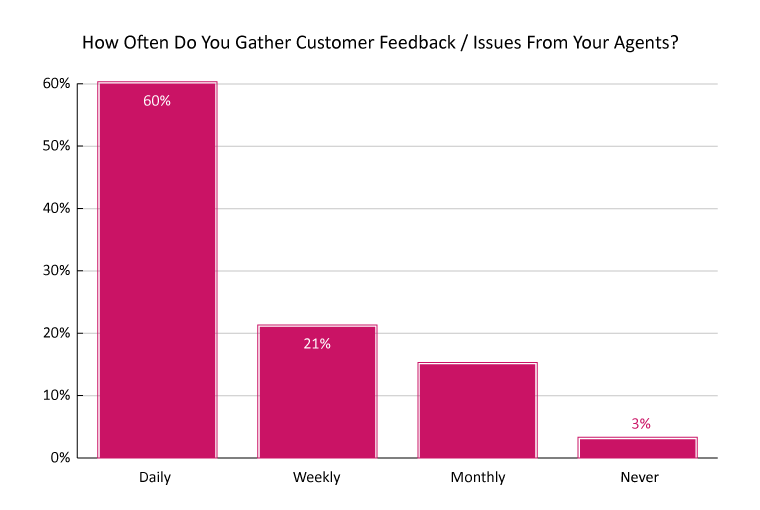Fed up with relying on feedback surveys (with depressingly low take-up rates) to figure out how your customers feel? Then tapping into the voice of your frontline is the answer!
To find out more, our Editor, Megan Jones, interviewed Nate Brown, Jenny Dempsey, and Rachel Williams for their top tips and strategies on how best to gather customer feedback from your frontline agents.
Here’s what they said…
Introduce VOC123 to Give Agents a Simple Framework to Follow
Success comes when your agents truly believe they are the voice of the customer, and one way to encourage this is to introduce a VOC123 programme.
Quite simply, this puts the emphasis on getting smarter with every customer interaction by giving agents a simple framework to follow – by answering the following questions every day (or week):
- What’s one positive thing you have heard that’s really helping us to earn customer loyalty?
- What’s one moment of friction you have heard that would give us an opportunity to do things better?
- What’s an interesting theme or recurring issue you are hearing more about that could help us to do better
It’s quick and easy for everyone involved. Just make sure you give agents a means to capture this insight – via your CRM or a handwritten notecard (for example).
Hand out USB Webkeys as “CX Magic Buttons”

Brown
When you’re trying to encourage a certain mindset within your people to change their behaviour, a physical reminder on their desks can really help – by acting as positive reinforcement.
Introducing a USB webkey “CX Magic Button” is a powerful way to do this. This simple device plugs into your computer or docking station and is configured to take the user to any URL once pressed.
If you link it to a simple feedback form (for example), this will empower your agents to hit the button and submit feedback to the wider business whenever they have a meaningful customer interaction.
Contributed by: Nate Brown, Co-Founder of CX Accelerator
Talk About Customer Feedback in Every Team Meeting
All too often in a contact centre, team meetings default to matters of productivity, Average Handling Time (AHT), quality, and company news.
To encourage agents to share more insights, however, customer feedback should be placed firmly on the agenda too – with equal weight and importance. This will help to reinforce the notion that talking about customer feedback is the norm and is expected as business as usual.
For example, the baton could be passed to a different agent each meeting for them to talk about the customer feedback they’ve heard, or a team leader could talk about how the management team are responding to recent feedback.
Contributed by: Rachel Williams, Founder & Training Consultant at The Experience Corporation
To learn more about the value of customer feedback and how to use it in the contact centre, read our article: 19 Reasons Why Collecting Customer Feedback Is Important for Your Organization
Make Sure Agents Feel Safe to Share the Good, the Bad, and the Ugly

Dempsey
If you want your agents to share more customer feedback with you, double-check you are truly offering a safe environment for them to do this – especially for negative feedback.
Why?
If agents feel they might get in trouble or face a backlash for sharing negative customer feedback, they won’t do it and you’ll never get the opportunity to fix the underlying issues!
Contributed by: Jenny Dempsey, Community & Customer Service Leader

| Frequency of Feedback Gathering | Response % |
|---|---|
| Daily | 60% |
| Weekly | 21% |
| Monthly | 15% |
| Never | 3% |
Start Referring to Your Agents as “Knowledge Curators”
Another way to emphasize the importance of gathering customer feedback is to also engage your agents with the bigger picture and the solution – nurturing them to be problem solvers, customer success managers, and true VOC professionals.
A good starting point is to rethink how you refer to your agents here, as Nate Brown recently discussed in a Sprinklr blog:
It feels to me like the title of “Agent” does not effectively capture the nature of this interaction. Perhaps a term such as “Knowledge Curator” is a better fit. When I think about the role of a knowledge curator in the context of a service centre, the following responsibilities come to mind:
- Seeks to establish an intimate understanding of the customer and their evolving needs
- Effectively shares knowledge acquired through customer understanding with the rest of the organization, making everyone smarter with each service interaction
- Helps to curate the pathways to knowledge for effective and accelerated sharing
- Creatively embraces their role as the personification of the Voice of the Customer, helping to connect employees across the organization to the Customer Experience effort
- Helps to solve friction points upstream in the customer journey, making the overall experience better for everyone
Make Proactive Courtesy Calls Part of Business as Usual (BAU)
Why not ask your agents to make proactive courtesy calls – with questions such as “How’s it going so far?” and “Is there anything you’re stuck on or that I can help with?”
By building these calls into your BAU processes, you are not only showing customers that you care and collecting valuable insights along the way, but also embedding a cultural mindset in your agents that customer feedback matters.
Contributed by: Nate Brown, Co-Founder of CX Accelerator
We have an article on courtesy calls and their impact on CX. Read it here: Courtesy Calls: A Great Way to Enhance CX
Don’t Email Out a Survey – Encourage Agents to Ask for Feedback Instead

Williams
Asking for feedback should be part of business as usual for your frontline.
Therefore, instead of relying on automated text or email surveys, which typically have low response rates, encourage your agents to engage with the feedback processes by taking ownership and asking directly for feedback at the end of every call.
Of course, some customers will still say “no”, but some will say “yes”, and this approach can help to improve response rates.
This also makes it easy for the customer AND the agent to capture feedback in the moment – before it gets forgotten about.
Contributed by: Rachel Williams, Founder & Training Consultant at The Experience Corporation
Act on the Feedback – or Agents Will Stop Giving It to You!
No matter how easy you make it for agents to give feedback, remember… If you ignore the customer insight they’re giving you and they don’t see anything come of it, they’ll stop giving it to you!
So, when asking for more customer feedback from your agents, make sure you’ve also got the time and means to do something with it – otherwise your feedback push will fail.
Contributed by: Jenny Dempsey, Community & Customer Service Leader
What Really Stops Leaders From Tapping Into Frontline Insight?
Even though agents are talking to customers most of the day in a very organic way and really understand the mindset of a customer, many leaders fall into the bad habit of dismissing any customer feedback that is unstructured – favouring structured customer feedback instead, such as a quantifiable C-SAT survey.
This is a big problem, as Nate Brown explains:
Generally speaking, 80% of valuable feedback is out there in an unstructured format, so when leaders are disregarding this because it’s not in a convenient bucket to include in their reports, they’ve really got to stop and ask themselves “Am I trying to drive a report or am I trying to actually learn from our customers?”
If you are looking for more advice on effectively collecting feedback in the contact centre, read these articles next:
- Stop Spamming! 10 Better Ways to Collect Customer Feedback
- 29 Ways to Transform Your Call Centre Staff Surveys
- 11 Best Practices for a Voice of the Customer Survey
Author: Megan Jones
Reviewed by: Xander Freeman
Published On: 26th Jun 2024
Read more about - Customer Service Strategy, Employee Engagement, Feedback, Jenny Dempsey, Leadership, Nate Brown, Rachel Williams, Sprinklr, Top Story, Voice of the Customer

















